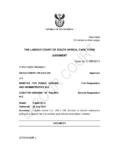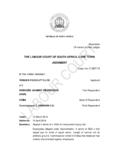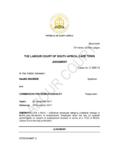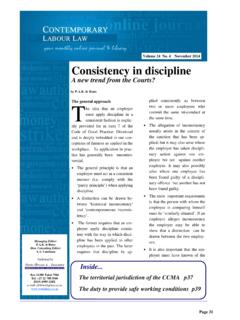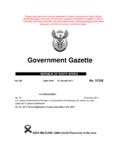Transcription of THE LABOUR COURT OF SOUTH AFRICA, CAPE TOWN …
1 REPUBLIC OF SOUTH africa Reportable THE LABOUR COURT OF SOUTH africa , cape town JUDGMENT Case no: C 293/2011 In the matter between: SOUTH AFRICAN POST OFFICE LTD Applicant and CCMA First Respondent W F MARITZ Second Respondent ELTON JACOBS Third Respondent Heard: 29 May 2012 Delivered: 18 June 2012 Summary: Review jurisdiction whether acting allowance is a benefit as defined in LRA s 186(2)(a). JUDGMENT STEENKAMP J: Page 2 Introduction [1] This is a jurisdictional review of an in limine ruling by the second respondent, commissioner Bill Maritz ( the commissioner ). The crisp question is whether the first respondent (the CCMA) had the jurisdiction to arbitrate a dispute concerning an acting allowance as an unfair LABOUR practice relating to the provision of benefits as contemplated by section 186(1)(a) of the [2] The commissioner found that the CCMA had jurisdiction.
2 He was persuaded that: .. where the terms of the employment provides for the payment of an acting allowance in appropriate cases that is the benefit and if the employer refuses it when it falls within the provisions of the particular rules I fail to see why should not be considered unfair conduct that could constitute an unfair LABOUR practice." [3] The commissioner did not rule on a further objection relating to condonation. He noted: "I have noted the further contention to the effect that the applicant is out of time and needs condonation for a late referral. It is clear that there is a dispute about the date to be taken into account and the same applies to whether the payment of an allowance is prescribed and in my opinion I do not need to apply my mind that this time, as that will be based on evidence.
3 " [4] The applicant has raised two grounds of review: The dispute was not a benefits dispute and the arbitrator therefore had no jurisdiction to require the CCMA set the matter down to determine the merits. The applicant raises three reasons: the commissioner ignored binding authority; the dispute had all the features of an interest dispute; and even if it was a rights dispute, it was a dispute about remuneration and not benefits. 1 LABOUR Relations Act 66 of 1995. Page 3 The commissioner failed to consider the applicant s second jurisdictional objection that the referral was out of time and that, as no application for condonation was brought, the proceedings were a nullity.
4 Background facts [5] The third respondent, Elton Jacobs ( the employee"), was employed as an operational manager from 1 July 2003. Clause 25 of his contract of employment pointed out the following: There are various other benefits and conditions of employment, inter alia, pertaining to 13th cheque, housing loan schemes, housing allowance schemes, subsistence and other allowances, et cetera that apply under specific circumstances. The complete conditions of employment of employees are contained in the various staff codes available for perusal at personnel offices, which are subject to change from time to time. " [6] The applicant has a policy relating to "acting in higher positions.
5 " The policy deals with the situation where employees acted in positions that have become vacant temporarily. A higher position" is defined as: A position with a higher minimum than the comparable position and the same or higher maximum in the salary range; or A position with the same or lower minimum and higher maximum in salary range. [7] Under the heading, "delegation of authority", the policy specifies that all acting appointments up to grade level C5 in the bargaining unit must be approved by a person holding a rank of at least a manager. Appointments to act in management positions must it provides employee holding a rank of general manager or regional general manager.
6 [8] The policy further provides for rotation after three months. The reason is explained as follows: LABOUR law recognises that in equity, allowing employees to act for unreasonably long periods in higher positions can be regarded as the creation of a legitimate expectation to ultimately be appointed in a higher position. Therefore, provided that the vacancy has been advertised, the Page 4 acting period may exceed one month, but is limited to three months per occasion." [9] At best, therefore, the policy provided a limited right to an acting allowance for three months if it was approved. The fact that approval was required means that there was no automatic contractual right to claim the acting allowance in the absence of such approval.
7 [10] On 20 December 2010 the employee referred an unfair LABOUR practice dispute to the CCMA in terms of section 186(2)(a) of the LRA. He alleged that the applicant had committed an unfair LABOUR practice by not paying him an acting allowance. [11] The dispute was set down for conciliation on 24 January 2011. It could not be resolved and the CCMA ( the conciliating commissioner) issued a certificate accordingly. The employee referred the dispute to arbitration, claiming an acting allowance from June 2008 to 31 January 2011. [12] The arbitration was convened on 31 March 2008. The Post Office (the applicant in these proceedings) raised two points in limine.
8 It contended that the dispute was not about benefits; and that it was about 4 years late, and was not accompanied by any condonation application. [13] The employee has claimed an acting allowance on numerous occasions since April 2006. It was only approved once in April 2006. Subsequent to that date, no further acting allowances were granted by a general manager, as contemplated by the policy. [14] On the employee's own version, the dispute arose in July 2008 when, according to him, he learnt that other employees were paid acting allowances and he was not. [15] Despite this, the commissioner found that he did not need to deal with the question of condonation, as a dispute existed in respect of the date on which the dispute had arisen and this was a question of evidence to be dealt with at arbitration.
9 [16] With respect to the first point in limine, the commissioner found that the payment of an acting allowance constituted a "benefit" and that it could be dealt with at arbitration as an unfair LABOUR practice. Page 5 Evaluation / Analysis First ground of review: Acting allowance a benefit as contemplated by section 186(2)(a)? [17] Section 186(2)(a) of the LRA provides that: (2) Unfair LABOUR practice means any unfair act or omission that arises between an employer and an employee involving (a) unfair conduct by the employer relating to the promotion, demotion, probation (excluding disputes about dismissals for a reason relating to probation) or training of an employee or relating to the provision of benefits to an employee.
10 2 [18] The CCMA does not have a general unfairness jurisdiction. An employee referring an unfair LABOUR practice dispute in terms of section 186 must demonstrate that it falls within that section. [19] In considering whether the CCMA had jurisdiction, this COURT must decide the matter afresh on review and the Sidumo 3 test does not [20] Does an acting allowance comprise a benefit as contemplated in section 186(2)(a)? Although the weight of authority suggests that it does not, our case law has not been wholly consistent in deciding this question. [21] In Northern cape Provincial Administration v Hambidge NO & ors5 Landman J had regard to the similarly worded definition under the now repealed Item 2(1)(b) of Schedule 7 to the LRA.










